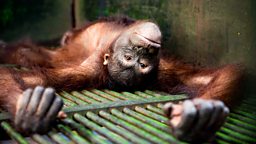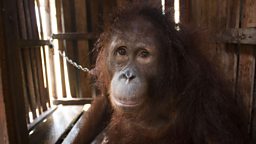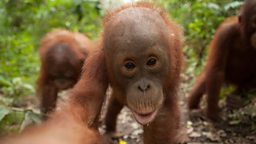Orangutans – Extinction is Forever
How our choice of toothpaste might save our closest cousins
By Dr Ben Garrod, an evolutionary biologist, primatologist and broadcaster and contributor to the Red Ape documentary.

I’m a scientist and I’d like to think a good one at that. As scientists, we’re trained to be objective, to see only what the hard data shows. The ultimate crime for a biologist is something called anthropomorphism – where we give ‘human’ emotions to animals; my dog is in love or my goldfish is guilty. Many argue that to overlay such emotions on animals shuts us out to what is actually going on and clouds our judgement. Yet here I am, almost in tears watching a mother who desperately loves her young son protect him against a world that has done everything to hurt them. After being ripped from her home she was passed from stranger to stranger, ready to be sold. After being rescued and having a son, she now lives a sad existence finding food around rubbish bins and looking on as unscrupulous guides grab her only child to have photos taken with tourists. So goes my first encounter with an orangutan in the ‘wild’ in Indonesia.
Her whole existence was washed in grief and I saw not an animal but a being.
I looked into that mother’s eyes and saw a palette of emotions I’d been trained to see past. She radiated an immense sadness and her tentative, hesitant movements were etched in fear. Her whole existence was washed in grief and I saw not an animal but a being. Not a human being but a being nevertheless. One that was trying as hard as she could to look small and unnoticeable, in the hope that the world might look past her and her infant son.
I could mention the big male I met, who would eventually be shot more than a dozen times by someone entrusted with his care, or even the mother who, through unbearable stress ate the body of her infant.
There are countless stories of orangutans going through emotional and physical hell because of us.

Unlike elephants, with their tusks for tacky-looking trinkets or shark fins used for soup as an ego boost for inadequate businessmen, or even rhino horn ground down into a ‘magic powder’ that simply won’t give you an erection regardless of how much you snort, eat or drink with tea, we can all impact orangutan conservation. Did you brush your teeth this morning, eat a bowl of cereal or grab a mid-morning snack at school or at work? If so, then you’ve very probably had a product with palm oil in it and if so then it’s very likely that it’s from an unsustainable source. Palm oil is used as a vegetable fat, because it’s easy to grow, has a high yield and is cheap to produce. It’s also high in saturated fats (the ‘bad’ kind).
If orangutans are to stand any chance of survival then we need to use sustainable palm oil...Dr Ben Garrod
Palm oil is found in so many commonly used supermarket products that some estimates place it in up to 50 per cent of the food and beauty products we buy. We may be consuming over seven kilograms of the stuff per year (think seven big bags of sugar).What's more, by 2050, global consumption of palm oil is set to double.
We can’t say we don’t add to the problem because the sad truth is that we do. It’s not easy to cut out all palm oil products for the average person or family. It’s everywhere and labels aren’t always that clear. If it says ‘palm oil’ on the ingredients then that’s a choice you can make, but often it slips under the consumer radar as ‘vegetable oil’. But there is a light at the end of the palm oil tunnel. Some supermarkets are taking a stand and are phasing it out from their own brands. Iceland was the first to make the announcement in April 2018, and it is hoped that more high street names will follow. We need to ensure that no more tropical forest habitat is razed to the ground to make way for endless fields of this almost uninhabitable monoculture and we need to see a phasing out of palm oil where it is unsustainably sourced or can’t be accounted for.

We’re at a crossroads now. We watched Blue Planet II and saw the harrowing impacts of plastic in our marine environments. We became proactive and now big brands and governments are actually making changes. Let’s do the same with palm oil and orangutans. You don’t need me to recite facts and list endless depressing research here. The truth is that every year, there is less and less forest in South East Asia. The truth is that palm oil production can claim a lot of responsibility. The truth is that orangutans are on a knife-edge right now, staring into the precipice of extinction. Their numbers are dropping, their homes disappearing. Extinction is not reversible. Once they’re gone, they’re gone.
What will we say when our children or grandchildren ask why we let our forest cousins go extinct?Dr Ben Garrod
These iconic, sentient, beautiful ape beings are one of our closest living relatives. They have the longest childhood of any animal other than us and have the longest break between having babies. They’re so like us and yet we’re letting them go, consigning them to sanctuaries, zoos and museums.
Don’t be sad, be proactive. Let the plight of these gentle ginger apes be a call to arms and let it galvanise us to not only make changes in the way we shop to but demand changes from retailers and governments.
What will we say when our children or grandchildren ask why we let our forest cousins go extinct? Will we really say because we didn’t check the label on our cornflakes?

